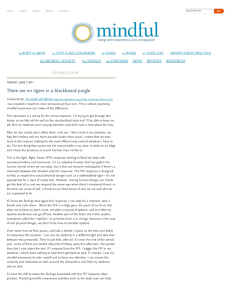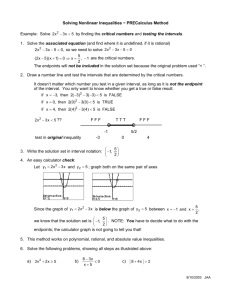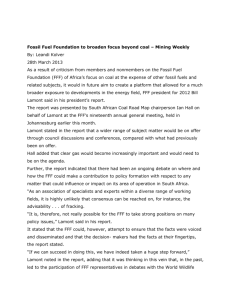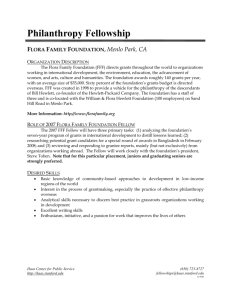The first, ad hoc, Steering Committee (SC) of the Forest... Rome from 10 to 11 January 2013.
advertisement
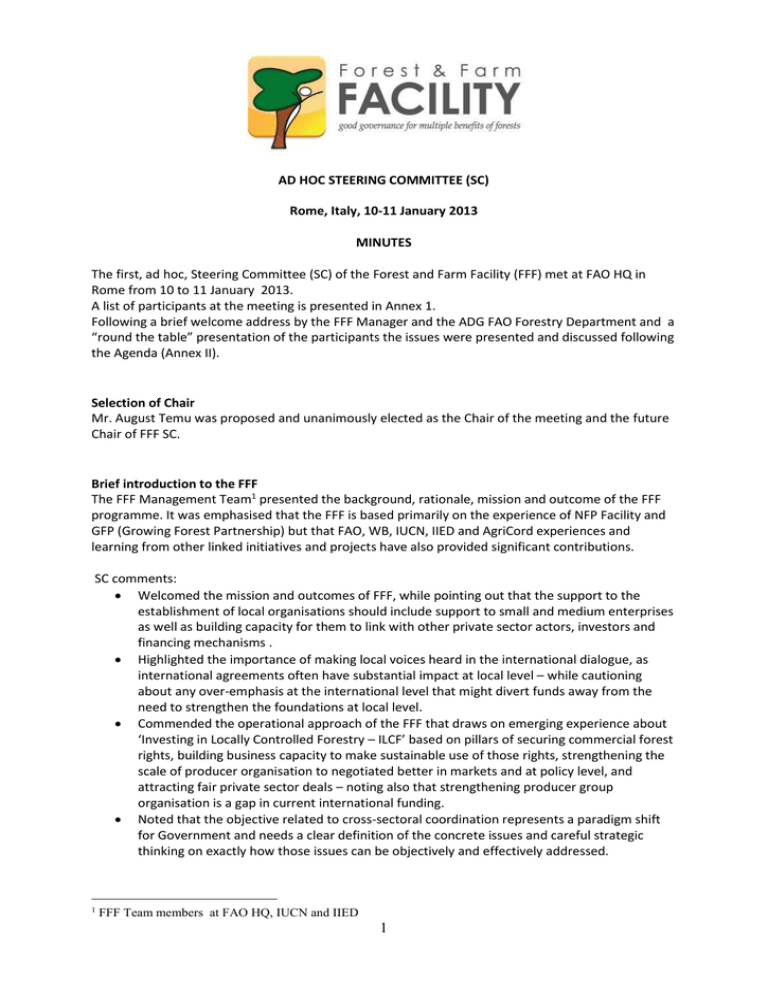
AD HOC STEERING COMMITTEE (SC) Rome, Italy, 10-11 January 2013 MINUTES The first, ad hoc, Steering Committee (SC) of the Forest and Farm Facility (FFF) met at FAO HQ in Rome from 10 to 11 January 2013. A list of participants at the meeting is presented in Annex 1. Following a brief welcome address by the FFF Manager and the ADG FAO Forestry Department and a “round the table” presentation of the participants the issues were presented and discussed following the Agenda (Annex II). Selection of Chair Mr. August Temu was proposed and unanimously elected as the Chair of the meeting and the future Chair of FFF SC. Brief introduction to the FFF The FFF Management Team1 presented the background, rationale, mission and outcome of the FFF programme. It was emphasised that the FFF is based primarily on the experience of NFP Facility and GFP (Growing Forest Partnership) but that FAO, WB, IUCN, IIED and AgriCord experiences and learning from other linked initiatives and projects have also provided significant contributions. SC comments: Welcomed the mission and outcomes of FFF, while pointing out that the support to the establishment of local organisations should include support to small and medium enterprises as well as building capacity for them to link with other private sector actors, investors and financing mechanisms . Highlighted the importance of making local voices heard in the international dialogue, as international agreements often have substantial impact at local level – while cautioning about any over-emphasis at the international level that might divert funds away from the need to strengthen the foundations at local level. Commended the operational approach of the FFF that draws on emerging experience about ‘Investing in Locally Controlled Forestry – ILCF’ based on pillars of securing commercial forest rights, building business capacity to make sustainable use of those rights, strengthening the scale of producer organisation to negotiated better in markets and at policy level, and attracting fair private sector deals – noting also that strengthening producer group organisation is a gap in current international funding. Noted that the objective related to cross-sectoral coordination represents a paradigm shift for Government and needs a clear definition of the concrete issues and careful strategic thinking on exactly how those issues can be objectively and effectively addressed. 1 FFF Team members at FAO HQ, IUCN and IIED 1 Recognised that large-scale corporate interests are highly organised and represented in decision-making processes across relevant sectors and that public and local communities need strategic capacity and platforms to achieve fair negotiations. FFF funding situation The FFF Manager gave an overview of the fundraising activities undertaken in 2012 and the outcome in terms of commitments and possibilities as of January 2013. Positive responses, for support to the global programme, have so far been received from Germany, Sweden, USA and the WB. However, he also pointed out that there are great opportunities for the FFF to leverage funds at regional and country level through cooperation with e.g. African DB, IADB, IFAD, APFNet and UNREDD. The upcoming WB/FIP call for proposals for the DGM (Dedicated Grant Mechanism for Community and Indigenous People) was also mentioned as an important opportunity, particularly the global component. WB informed that the call for expressions of interest for the DGM will be out by end January 2013. Given the present funding situation, the FFF manager concluded that i) continued fund raising is absolutely necessary ii) quick and positive results on the ground in pilot countries would be important and iii) a serious review of concept and funding must be done in 2014. SC comments and suggestions on the continued fund raising: Agreed on the conclusions and strategy presented – including the need to re-target former supporters of the NFP-Facility such as DFID and the EC Suggested a clearer focus on ‘entrepreneurship’, and the need to support entrepreneurial organisation within smallholder farming and forest groups – following the current multidonor emphasis on private sector engagement Highlighted the aspect of aid coordination and efficiency Emphasized the strong producer group representation (IFFA, GACF, IAITPTFs, Agricord, Alianza) in the FFF SC and suggested to make use of this representation in fundraising Noting that funding is often available at country level, the SC suggested that the FFF could leverage and harmonize donor funding for direct support to local organisations – particularly by mobilizing the multi-institutional partnership within the SC and Management team to push for in-country support Proposed to develop a three-pronged nested strategy for fundraising i) core – the programmatic part, including support to the secretariat, through the trust fund ii) country activities through earmarked donor funding, and iii) collaboration with partners in Sweden, Finland etc. for twinning arrangements with FFF supported organisations at country level Facilitate access to domestic funding resources in FFF countries FFF Management Team should give high priority to the actions needed in order to be selected for the global component of the WB/FIP DGM FFF Governance The FFF management team presented to proposed governance structure, including the Steering Committee and its composition and the Donor Support Group. The SC expressed appreciation of the clear role proposed for the committee, focusing on programmatic issues and not on the running of the office and day to day operations. Regarding the composition, the SC discussed the possible emergence of a conflict of interest for members representing stakeholder organisations requesting for FFF support. SC comments and decisions: Decided that the SC should consist of a mix of individuals, balanced between professional background, geographical distribution and gender, and elected representatives of FFF stakeholder groups (like G3). 2 Decided to maintain the members of the ad hoc SC, but add another three individuals to the SC with background/experience from i) finance and investments ii) women groups and iii) youth organisations. In addition, it agreed that 1-2 representatives of the donors should be included. Agreed that the Management Team , with support from the SC, should identify possible candidates for the three additional posts while taking into account, in particular, the need for improved gender balance. The Management Team will propose (through mail) identified candidates to the SC for selection. Agreed that conflict of interests should be avoided in decision-making by agreeing to abide by a strict ‘out-of-the-room’ policy in any decisions in which conflicts of interests were likely to occur. Promoted the idea of SC members being FFF champions and good will ambassadors Suggested the possibility of inviting resource persons to the SC meetings FFF Management The Manager presented the set-up and basic role of the small team to be based at FAO HQ. The objective is to keep the costs of the management (programme delivery) at around 20% of total costs. However, he added, although the present management team is kept at a minimum it will not be possible to reach the 20% cost target until further funding for country/regional support has become available. He pointed out that the support provided by WB/Profor for the participation of IUCN and IIED in the management team is for 2013 only and that the intention was to institutionalise those costs within the overall Management Team costs in future years – funding permitting . SC comments and decisions: Approved the management set up as proposed Emphasized that the long-term cost for programme delivery should not exceed 20 % of the total and that the management composition should be reviewed towards the end of 2013 based on the forecasted funding situation for 2014. __________________________________________________________________________________ FFF Monitoring The Management Team briefed the SC on the existing on-line database established by the NFP Facility for monitoring inputs and outputs, including financial data, and results versus objectives and targets in grant agreements. The same system will be used by the FFF. For monitoring more long term outcomes and impact a system will be developed by the management team to be tested at the start up of activities in pilot countries. The system, based on experience from the NFP Facility and GFP, should be simple with only a few carefully selected indicators and build on the participation of programme beneficiaries and stakeholders and thus serve as a combined monitoring and capacity building tool. SC comments: Welcomed the proposal and emphasized the need to develop the outcome and impact monitoring system urgently in order to do a baseline before activities start. The SC member from AgriCord offered collaboration from his organisation in the work. Agreed that there is a need to have a more focused and strategic view on what the FFF should try to achieve in-country and internationally and that it should establish a system to track these strategic objectives. It should not just be a small grant mechanism measured by the number of grants. 3 FFF support mechanisms and modus operandi The FFF Manager presented the two principal funding mechanisms; i) grants and the more long term ii) partnership agreements. The small grant mechanism (average 25.000 USD) will be used to fund start up activities and the partnership agreement for providing more long term funding security (max 400.000USD over a period of 3 years) of existing or emerging organisations. He concluded, given also the present budget situation, that during the first year of FFF operations support will be focused on start up activities in pilot countries and the small grant mechanism will be used. Decisions on entering into a partnership agreement is proposed to be taken by the SC, based on a Concept Note prepared by the recipient organisation and the initial experience gained by the FFF of the small grant support provided. Eventual proposals for partnership agreements will be presented to the SC, within existing budget frame, for decision at the next SC meeting. The Management Team presented the proposed modus operandi for country as well as regional and international organisations to be selected for FFF support. Regarding country selection, in future additions to in-country support (beyond the selection of start-up countries where government support was known to be high) the need for a formal expression of interest from Government was highlighted as a basis for being considered. SC comments and decisions: There is a need to develop a definition of who the grantees/stakeholders are. Need to focus on representative organisations of those groups with rights to forest and forest land and with ownership of production. Ownership is key, not the scale. “Local democratically controlled producer groups” was proposed as a draft definition – in part to avoid capture of resources by well-intentioned NGOs Forest Right holders associations should be engaged at different levels, including at the country level implementation With respect to Govt grants for establishment of cross-sectoral fora, the SC emphasized the importance of getting the relevant Government unit/department involved at high level and added that the Forest Department may not be the most relevant entry point as was the case in the NFP Facility. Given the funding situation the max amount available for partnership agreements should, for the time being, be reduced to 100.000 USD /year or in total 300.000 USD Operational guidelines for the FFF should be produced and presented at the next SC Selection of FFF Pilot Countries In order to get FFF started and get quick positive results the Management Team presented 4 candidate countries in Latin America, 4 in Africa and 3 in Asia. The following criteria were used: A. Experience gained by NFPF/GFP/FC and other relevant programmes B. Known interest/possibility to strengthen or create farmer organsiations C. Government interest to strengthen cross-sector cooperation (no formal expression of interest requested or received as demanded in the proposed modus operandi ) D. Possible outputs/added value by the FFF support SC comments on selection procedure: Based on member experience two countries were added to the list; Indonesia and Ethiopia Criteria on transferability of experiences and learning gained was added as well as political stability and continuity. SC emphasized that quality should not be compromised for quick results Emphasized that regional balance is important Emphasized that this selection process should be used only at this occasion to get started 4 The next selection process by the SC should be based on expressions of interest by Governments and criteria for selection agreed to by the SC. A proposed list of criteria should be prepared by the Management Team for decision by the SC Based on individual rating of the 13 listed countries by SC members ( Latin America: Bolivia, Guatemala, Nicaragua, and Paraguay, Asia: Indonesia, Nepal, Myanmar and Vietnam, Africa: Ethiopoia, Gambia, Kenya, Liberia and Tunisia) the final selection was made by the SC. SC members from proposed countries (Guatemala, Nepal) left the room during the rating of countries in their respective regions. Based on the scoring the SC decided to give the management the mandate to start FFF operations in six countries, two “neighboring” countries per region, as follows : Latin America: Guatemala and Nicaragua Africa: Gambia and Liberia Asia: Myanmar and Nepal The selection of neighboring countries should facilitate exchange of experiences and learning and strengthen regional or sub-regional cooperation. 5 FFF Work plan for 2013 Following discussions the following general work plan was approved by the SC. Activity Time 10-11 January Ad hoc Steering Committee January –April Implementation start: January - August February – November February - November April- June 14 – 15 November in Rome Scoping missions/launching in selected pilot countries Contracting G3 for a global baseline study on existing member based forest organizations at national , regional and global levels Development and introduction of Monitoring System Development of Communication Strategy Finalize criteria for support to national, regional and international organizations Announce the possibility of FFF support to potential countries and regional and international organizations (targeted on organizations with members in selected pilot countries) Identify candidates for three additional SC members Preparation of international meeting ( tentatively in China or a FFF pilot country) on the key role of smallholders, community, women and IP groups for sustainable forest management Jointly with AgriCord undertake an analytical study on the relevance and role of local membership based organizations as stakeholders of the FFF Continued fundraising: Visit to African Regional Economic Communities ECOWAS, EAC, SADC, COMIFAC) Organize regional/sub regional workshop in Africa to exchange experience on bank credits for productive agro-forestry activities of smallholders and community forestry Preparation for WB FIP/DGM bid Renewed contact with Finland, EC and UK Introduction of the new Facility Manager FFF 1st Steering Committee to review and reflect on: The pilot operations The budget situation including costs for programme delivery, The study undertaken by G3, Criteria for selection of countries and regional/international organization Possibility to select a next group of countries and enter into partnership agreements with national, regional and international organizations The monitoring system The communications strategy 6 Selection of the new FFF Manager The SC elected August Temu (Chairperson) with Ignace Coussement as alternate to represent the SC in the selection process of new FFF Manager. (The FAO SC member informed that the VA has a deadline for applications on 18th January and the selection process is expected to take place during February) The SC expressed concern over the potential gap in the Manager position and urged FAO to minimize the time and requested the outgoing manager to provide support during the transition period and be present at the next SC meeting as a resource person. Next (1st) SC meeting It was decided that the next SC meeting will be held in Rome on 14 -15 November 2013 Closing of the meeting The Chair thanked the ad hoc SC members for their contributions and enthusiasm and wished the Facility management team all success in the start up of operations as well as in the continued fund raising efforts. 7 ANNEX I LIST OF PARTICIPANTS Steering Committee Members NAME POSITION CONTACT August Temu (Chairperson) Dy DG World Agroforestry Centre (ICRAF) Nairobi, Kenya a.temu@cgiar.org tel. +254 20 722 4197 Chairperson International Family Forest Association Canada grandpic@nbnet.nb.ca tel: +1 506 367 2503 Estebancio Castro Díaz Executive Secretary International Alliance of Indigenous and Tribal peoples of Tropical Forests Panama estebancio@international-alliance.org tel. + 507 3921074 mob: +507 611 53 101 Ghan Shyam Pandey Coordinator Global Alliance of Community Forestry Kathmandu, Nepal pandeygs2002@yahoo.com tel. 00977 1 4485263 mob: 00977 9851002110 Peter deMarsh Juan Raymundo Morales Ovando. Presidente Alianza Nacional de Organizaciones Forestales Communitarias de Guatemala Guatemala alianzaofcguate@gmail.com federafogua@yahoo.es tel. +502 776 36 131 mob: +502 532 19 824 Emelia Arthur Deputy Regional Minister Western Regional Coordinating Council Sekondi, Ghana Managing Director AgriCord Leuven, Belgium ignace.coussement@agricord.org Ignace Coussement Senior Forestry Advisor Agriculture & Rural Development The World Bank Washington DC, USA pdewees@worldbank.org tel. +1 202 4584021 fax. +1 202-614-1402 Peter Dewees emelia.arthur@gmail.com tel. +233 244 469 015 tel.+32 (0)16 242750 mob: +32 473 882 104 Eduardo Rojas (on 10 January) ADG FAO Forestry Department Rome, Italy eduardo.rojas@fao.org tel. +390657055879 Eva Muller Director FAO, Forest Economics, Policy and Products Division Rome, Italy eva.muller@fao.org tel. +390657054628 FFF Management Team NAME Jerker Thunberg Jhony Zapata Sophie Grouwels Marguerite FranceLanord Zoraya Gonzalez Chris Buss Duncan Macqueen CONTACT jerker.thunberg@fao.org tel. +390657054530 jhony.zapataandia@fao.org tel. +390657053102 sophie.grouwels@fao.org tel. +390657055299 marguerite.francelanord@fao.org tel. +390657054304 zoraya.gonzalez@fao.org tel. +390657054205 chris.BUSS@iucn.org Tel. +41229990265 duncan.macqueen@iied.org tel. +44 131 226 6860 8 AD HOC STEERING COMMITTEE (SC) ANNEX II FAO HQ, Rome Queen Juliana Room (B 324) 10-11 January 2013 Agenda Thursday 10 January Time 10:00 10:30 Welcome and round the table presentations Selection of Chair for the meeting Brief presentation of the Forest & Farm Facility - Background (NFPF and GFP) and Rationale - Mission, Beneficiaries and Outcomes Questions & Discussion Funding situation - Fund raising activities - Financial situation at the beginning of 2013 Questions & Discussion 12:30 14:00 Lunch Break Proposed Organisation and Management - Governance structure - Steering Committee - Donor Support Group - FAO (hosting FFF) - Operational Management - Role of Management Partners; IUCN, IIED and WB Profor Discussion and SC recommendations 15:30 16:00 Coffee Break Support Instruments and Modus Operandi - Grants, to Stakeholders and Government (Letter of Agreement) - Partnership Agreement with lead organisations Discussion and SC recommendations 18:00 Closure of the day 19:30 Dinner hosted by the Facility 9 Friday 11 January 09:00 Summary of recommendations and conclusions reached Day 1 10:00 Coffee Break 10:30 Selection of Pilot Countries for 2013 (3 + 3) - Criteria and procedure for selection? - Management proposal on possible pilot countries Selection of regional and global level organisations - Criteria and procedure for selection? Discussion and SC decision 12:00 Lunch 13.00 How to get started in pilot countries? - Selection of local, sub-national and national partners/beneficiaries in pilot countries ? Discussion and SC recommendations 15:00 Coffee Break 15:30 Monitoring and Reporting - Presentation of proposal Discussion and SC decision 16:30 SC representative(s) in selection panel for Facility Manager position Next SC meeting – when and where ? Discussion and SC decision 17:00 Closure of the meeting 10

